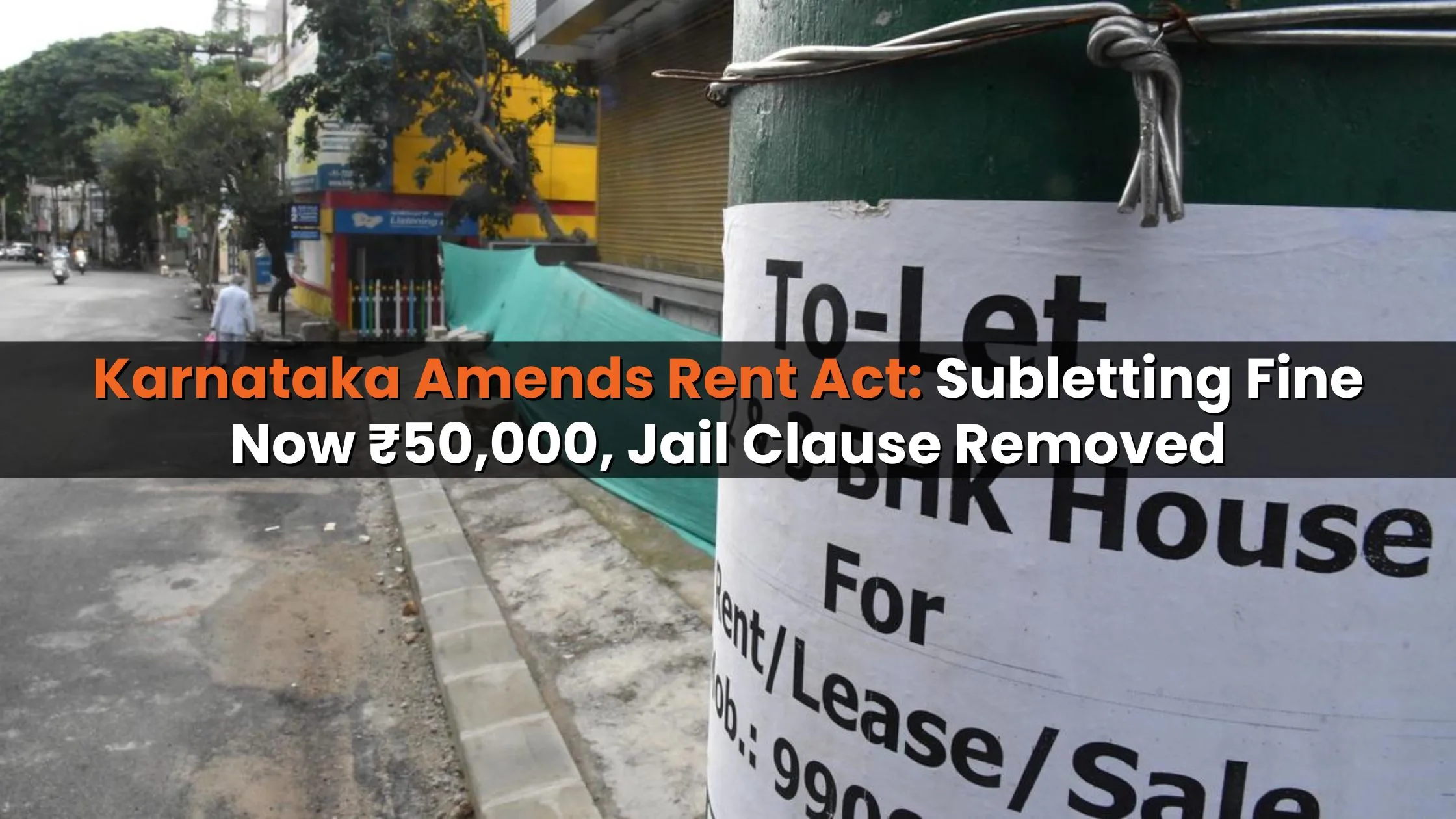Table of Content
▲
Karnataka has taken a significant step toward reforming its rental housing laws by introducing major amendments to the Karnataka Rent Control Act, 1999. In this update, the government has decided to decriminalize certain rental disputes while at the same time increasing penalties for violations. Most notably, fines for subletting without permission or unlawfully evicting tenants have been raised tenfold, from ₹5,000 to ₹50,000. At the same time, the earlier provision of imprisonment has been removed, signaling a more balanced and reform-driven approach.
These reforms come at a time when rental housing demand is increasing in Bengaluru and other urban centers, and they reflect the state’s attempt to create a fairer and more transparent rental ecosystem. By ensuring stricter fines while removing the fear of jail, the changes are designed to protect both landlords and tenants.
What Changed in the Karnataka Rent Control Act?
The amendments mark a substantial departure from the older provisions of the 1999 law. Until now, disputes such as subletting, illegal eviction, and misrepresentation of property details carried both fines and potential jail terms. Under the revised law, nine such offenses have been decriminalized, meaning they will no longer attract imprisonment but will instead carry higher financial penalties.
Some of the key violations now attracting monetary penalties include:
- Subletting a property without the landlord’s consent.
- Unlawful eviction of tenants by landlords.
- Falsifying property details in rental agreements.
- Real estate agents or middlemen operating without mandatory registration with rent controllers.
The government has designated assistant commissioners and tahsildars as rent controllers under the amended law, ensuring quicker dispute resolution at the local level.
Also Read: Festive Season Boosts Mumbai Property Deals: Registrations +32%, Duty +47%
Steeper Penalties for Subletting and Unlawful Evictions
Perhaps the most striking change is the sharp increase in fines for subletting and unlawful eviction.
- Illegal Subletting: Tenants found guilty of subletting their rented premises without permission will now face a penalty of ₹50,000 or double the monthly rent earned from subletting, whichever is higher.
- Unlawful Eviction: Landlords who attempt to forcibly evict tenants will also be liable for the same penalty.
Earlier, the law prescribed a ₹5,000 fine along with up to one month of imprisonment, which was often criticized as being too lenient in monetary terms and too harsh in criminal terms. The new structure addresses both concerns by imposing steeper fines while doing away with imprisonment.
Decriminalization: Removal of Imprisonment Clause
One of the most progressive aspects of the amendment is the removal of imprisonment for these rental offenses. The earlier law allowed landlords and tenants to face jail time for disputes that were often civil in nature. Critics argued that this clause was misused, leading to harassment and unnecessary criminalization of small disagreements.
By eliminating imprisonment, Karnataka amends Rent Control Act to focus on monetary deterrence rather than punitive incarceration. This move aligns with the Jan Vishwas Act, 2025, a central government initiative aimed at decriminalizing minor offenses across various sectors to reduce litigation and harassment.
Other Key Amendments
Apart from subletting and eviction penalties, several other notable changes have been introduced:
- Falsification of Property Details: Any party providing false or misleading information in rental agreements will face significant penalties.
- Unregistered Agents: Real estate agents and middlemen who fail to register with the rent controller will now face a fine of ₹20,000 per day until they comply.
- Strengthened Governance: By designating assistant commissioners and tahsildars as rent controllers, the government aims to decentralize authority and speed up rental dispute resolution.
These amendments strengthen accountability in the rental market and aim to curb malpractice by agents and intermediaries.
Why the Need for These Changes?
The rental housing sector in Karnataka, especially in Bengaluru, has been facing challenges due to rising disputes, lack of trust between landlords and tenants, and misuse of legal provisions. The previous law, with its jail clauses, discouraged many property owners from renting out their homes for fear of criminal cases. At the same time, tenants often exploited legal loopholes to continue unauthorized subletting.
The new amendments serve multiple objectives:
- Aligning with National Reforms: By removing imprisonment clauses, the state is bringing its law in line with central reforms under the Jan Vishwas Act.
- Encouraging Rental Housing: By removing fear of harassment and reducing litigation, more landlords may be willing to rent out properties.
- Balancing Fairness: While landlords gain relief from jail threats, tenants remain protected through hefty fines on unlawful evictions.
Impact on Karnataka’s Rental Market
The amendments are expected to reshape Karnataka’s rental housing market in meaningful ways:
- Boost to Rental Supply: With reduced legal risks, landlords who had earlier kept homes vacant may now rent them out, easing housing shortages in urban centers like Bengaluru.
- Curb on Subletting: Hefty fines will act as a strong deterrent for tenants who profit from unauthorized subletting.
- Transparency and Trust: By decriminalizing disputes but imposing strict monetary penalties, both landlords and tenants can engage with greater confidence.
- Reduced Vacancies: The fear of prolonged disputes often led to vacant properties. These reforms may help reduce such cases.
Overall, the amendment is expected to promote a more balanced rental ecosystem, benefiting both parties while encouraging more housing stock to enter the market.
Expert Opinions on the Amendment
Real estate experts and industry stakeholders have broadly welcomed the reform. According to housing analysts, the decision to replace jail terms with financial penalties is a progressive and balanced move.
- For Landlords: The removal of imprisonment reduces harassment risks and encourages more people to put properties on rent.
- For Tenants: The hefty penalties on landlords for unlawful evictions ensure that tenant rights remain protected.
- For Agents: Stricter fines for unregistered real estate agents are expected to clean up the brokerage system and ensure accountability.
Experts believe these changes will foster trust, reduce litigation, and streamline the rental housing market in Karnataka.
Also Read: SC Grants Conditional OCs for Six Godrej Nest Towers, Relieving 400+ Noida Buyers
Conclusion
The amendment of the Karnataka Rent Control Act is a landmark reform that raises penalties to ₹50,000 while removing imprisonment clauses for rental violations. By focusing on deterrence through financial penalties rather than criminalization, the state has taken a progressive step that protects both landlords and tenants.
In the long run, these changes are likely to promote transparency, reduce disputes, and encourage more homes to be rented out, ultimately creating a healthier and more balanced rental housing market in Karnataka.






_1770286619.webp)
_1770284675.webp)

Ans 1. The amendments increase fines for violations like subletting without permission and unlawful eviction to ₹50,000, while removing imprisonment clauses. Additionally, offenses such as falsifying property details and operating as an unregistered real estate agent now attract financial penalties, and assistant commissioners and tahsildars have been designated as rent controllers for faster dispute resolution.
Ans 2. Tenants subletting their rented property without consent and landlords carrying out unlawful evictions are liable to pay ₹50,000 or double the monthly rent earned from subletting, whichever is higher. Previously, these offenses carried a fine of ₹5,000 along with up to one month of imprisonment.
Ans 3. Yes, imprisonment for rental disputes, which were often civil in nature, has been removed. This aligns Karnataka’s law with the central government’s Jan Vishwas Act, focusing on monetary deterrence rather than criminal punishment.
Ans 4. Real estate agents and middlemen who fail to register with the rent controller are now liable for a fine of ₹20,000 per day until they comply. This measure strengthens accountability in the rental market.
Ans 5. The previous law created fear among landlords due to potential criminal cases, discouraging many from renting their properties. Tenants, on the other hand, sometimes exploited legal loopholes for unauthorized subletting. The amendments aim to balance fairness, encourage rental housing, and reduce litigation.
Ans 6. Assistant commissioners and tahsildars have been given the authority to act as rent controllers, allowing disputes to be resolved quickly at the local level.
Ans 7. Landlords benefit from reduced legal risks and removal of imprisonment threats, which encourages more property owners to rent out their homes.
Ans 8. Tenants remain protected from unlawful eviction, as landlords now face hefty fines for such violations. This ensures tenant rights are safeguarded without criminalizing minor disputes.
Ans 9. Yes, by reducing fear of litigation and harassment, more landlords are likely to list their properties for rent, potentially easing housing shortages in urban centers like Bengaluru.
Ans 10. The steep fines act as a strong deterrent against unauthorized subletting, promoting compliance and transparency in rental agreements.